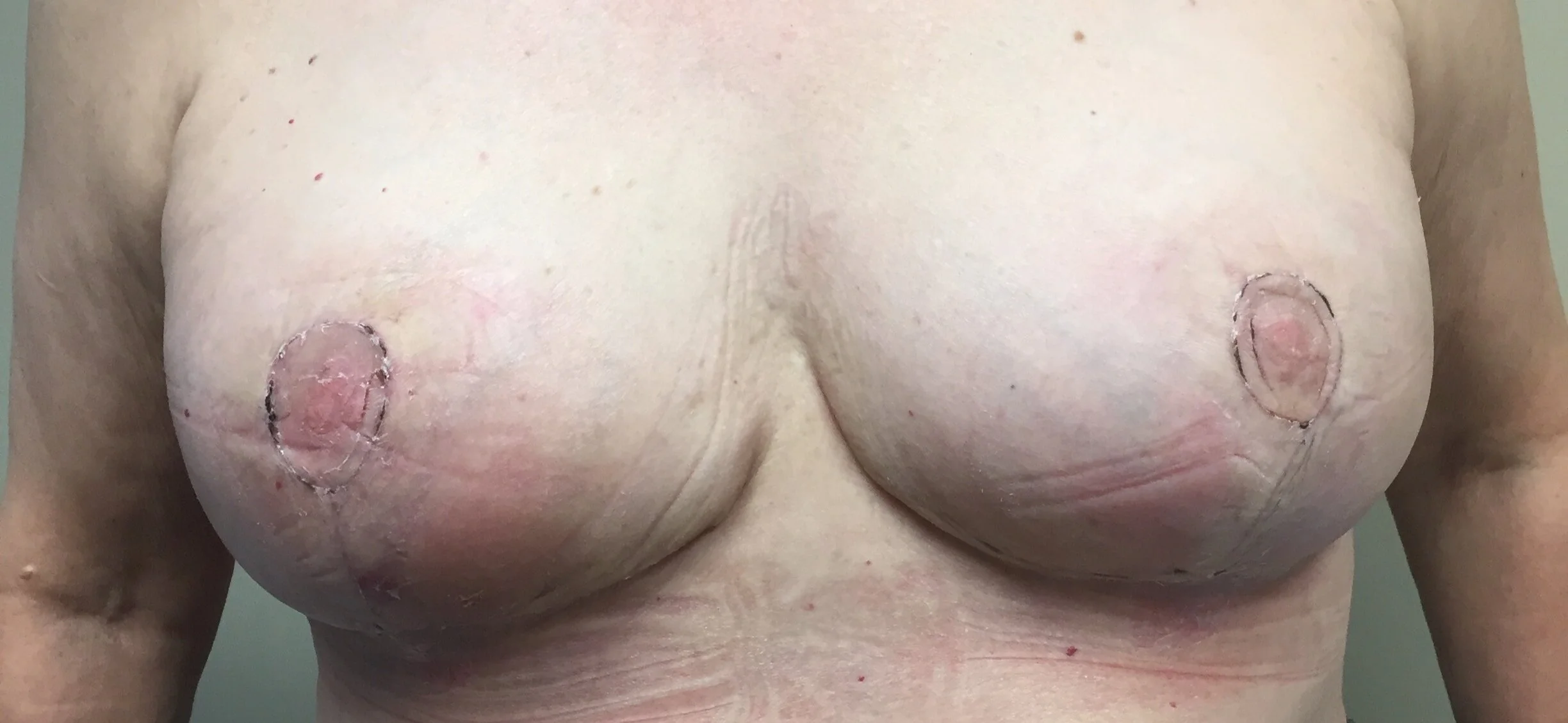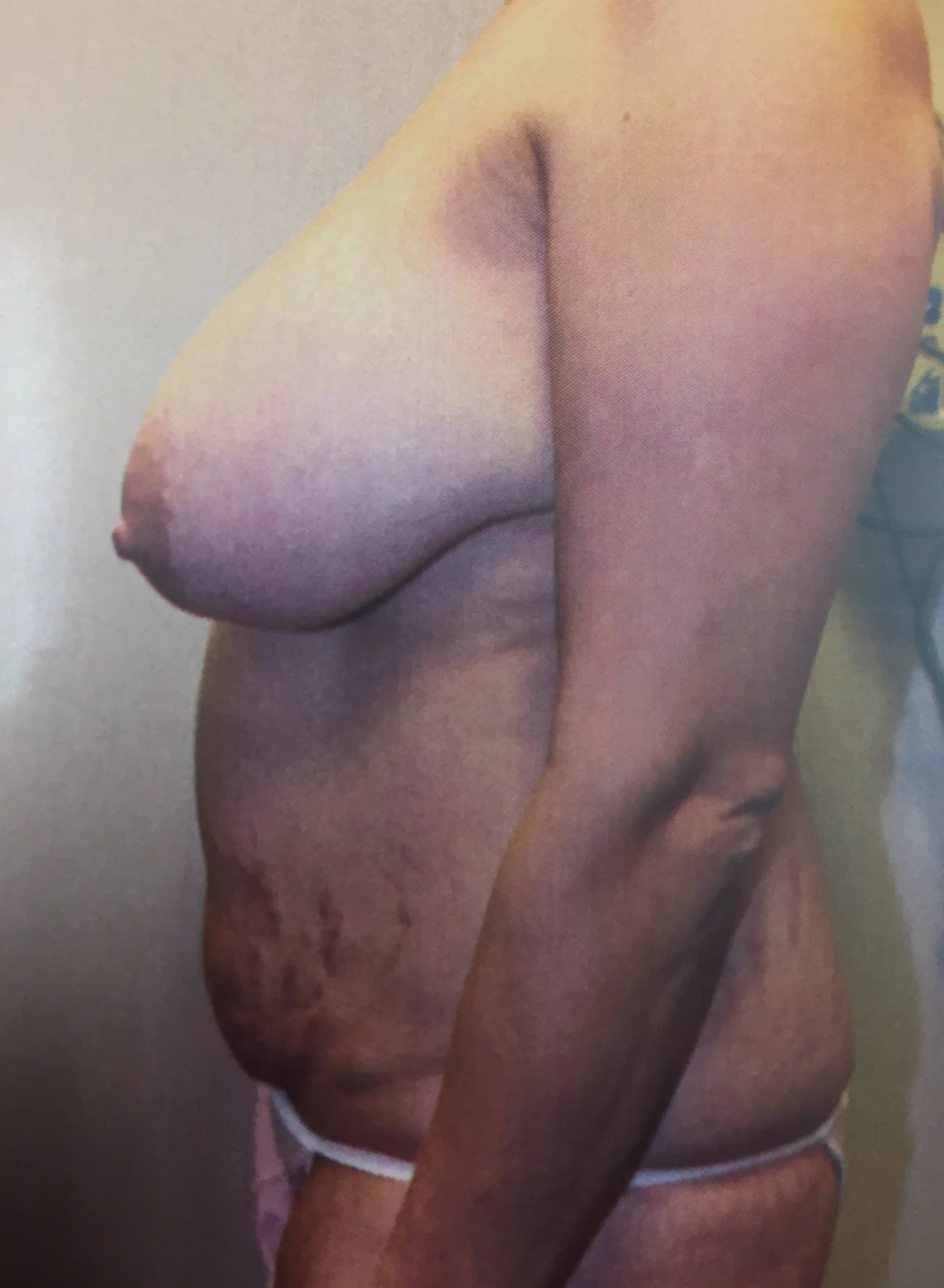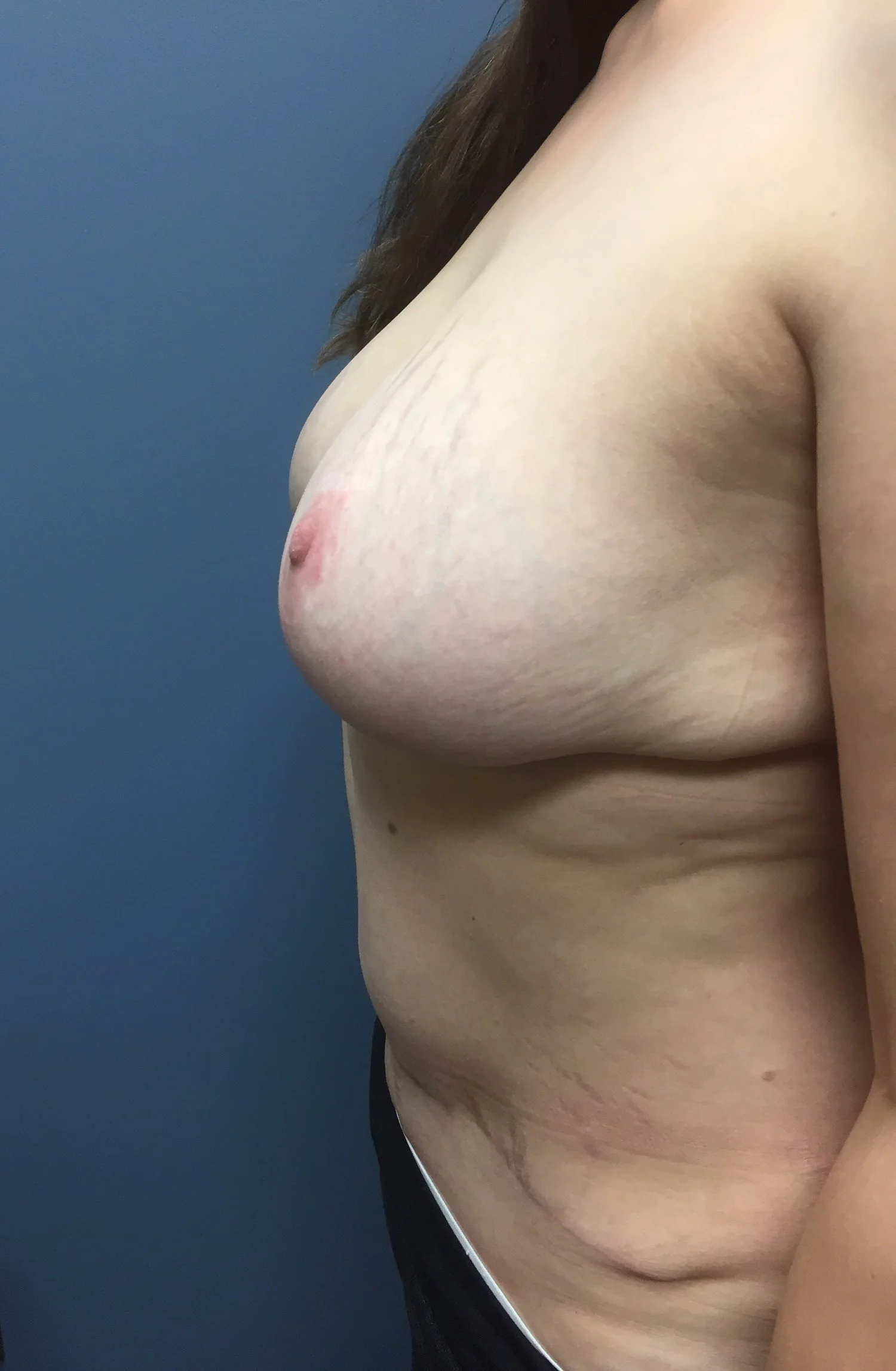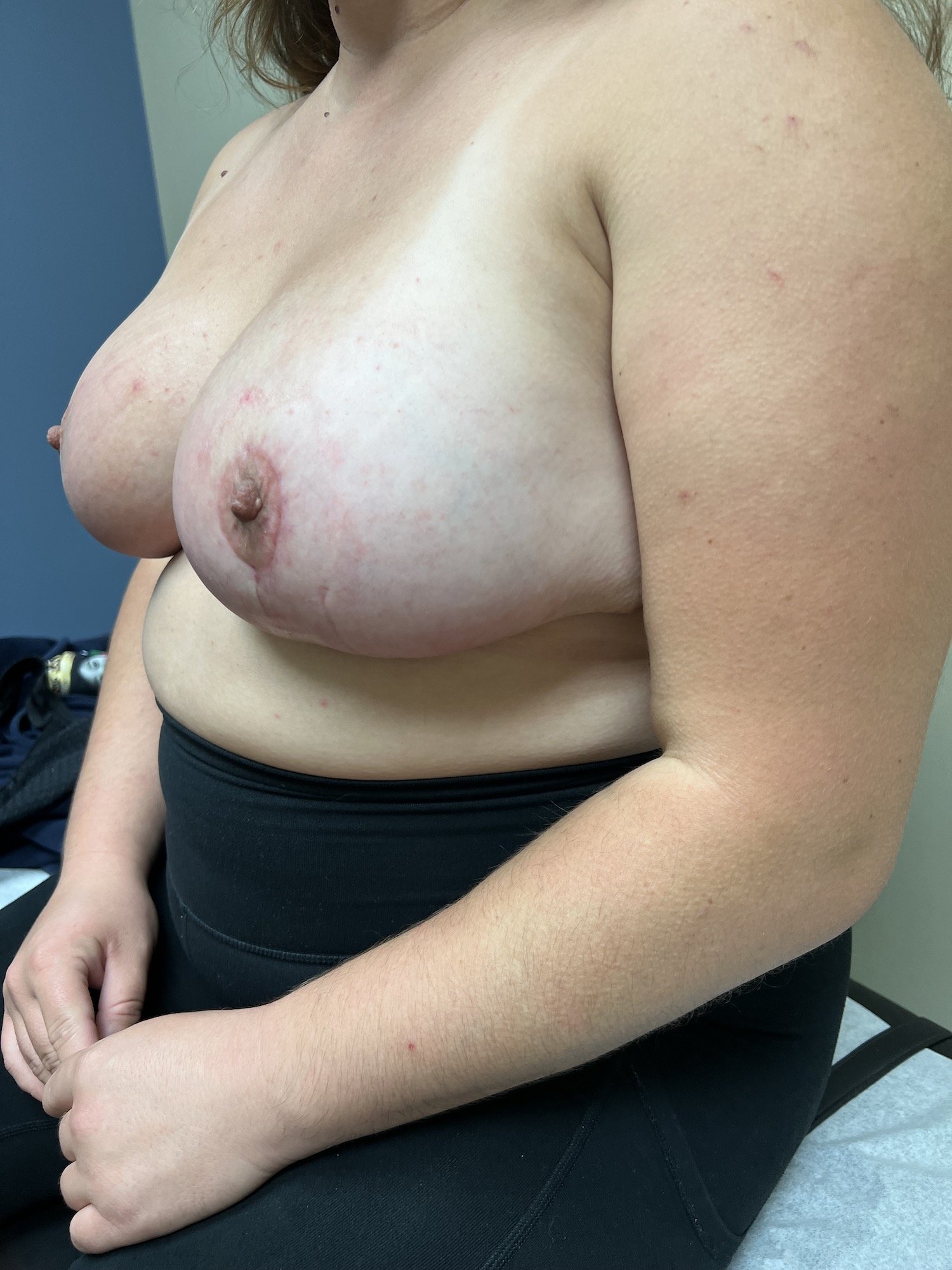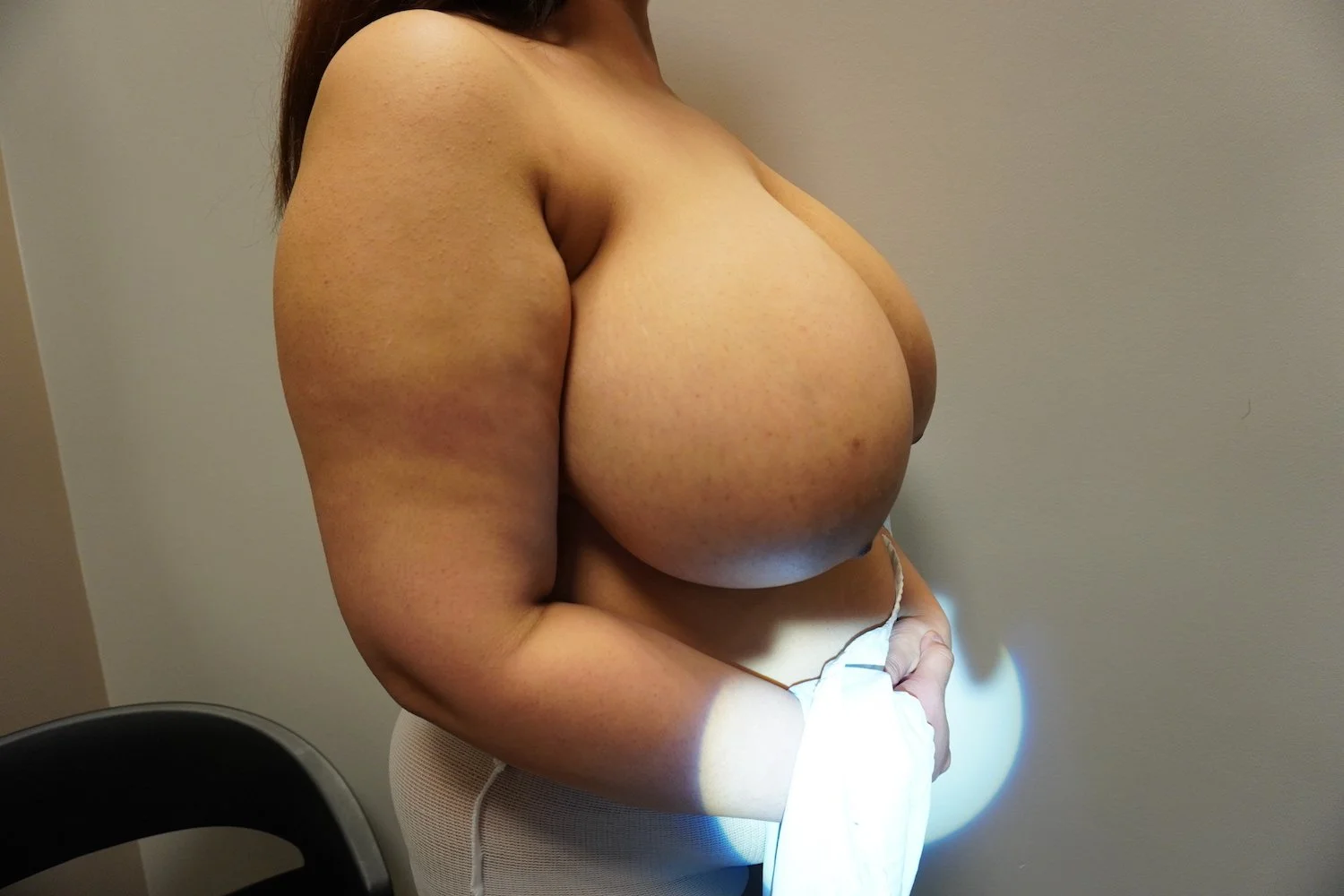
Reduction
*DISCLAIMER: THIS SITE CONTAINS GRAPHIC & SURGICAL IMAGES THAT MAY BE DISTURBING TO SOME VIEWERS.
THIS SITE IS INTENDED FOR INDIVIDUALS OVER THE AGE OF 18.
**None of the images on this site have been enhanced or photoshopped.
Patient F - Pre-operative and 6 weeks post-operative Breast Reduction


Before & After Photos
*Tap a patient image to enlarge & view the full series of pre and post-operative images.
Before the Surgery:
+ What is a Breast Reduction?
This is a day surgery procedure (the patient goes home the same day) done with the patient asleep (General Anesthesia), where the size and the shape of the breast is surgically changed to improve the breast shape, posture, and reduce the size of the breast.
+ Who can have a Breast Reduction?
The youngest age for breast reduction surgery is typically after full breast growth is complete (age 18-19); there is no limit to an older patient (this would depend on the patient’s general health in order to have a General Anesthetic).
Occasionally, the surgery is done on an adolescent before full breast growth is complete. If the breasts are extremely large, interfere physically, and impact psychologically, surgery may be done with the understanding that if the breasts continue to enlarge after surgery, a repeat breast reduction after full breast maturity may be necessary.
There are young patients that have developmental abnormalities of the breast, that may also be corrected in the peri pubertal age period.
The Operation:
+ How is a Breast Reduction done?
The surgeon will draw on your breasts before the surgery.
+ How is a Breast Reduction done?
The nipple areola and the breast will be elevated and reshaped into a more pleasing posture. The nipple areola is left attached to the breast in order to maintain circulation and sensation to the nipple. The breast tissue is removed and contoured within the skin incisions, which are closed with dissolving sutures. The breast shape and size with then be adjusted surgically. The nipple areola will be elevated to the correct position on the breast, leaving the blood and nerve supply intact. The breast tissue is shaped and then the incisions are closed with stitches underneath the skin. These sutures will dissolve.
You will require a General Anaesthetic. The surgery takes 1 1/2 - 2 hours.
If the breast shape is being adjusted, but NOT the breast size, then skin only is removed, and the breast is reshaped. This is called a Breast Lift or Mastopexy. *Please see FAQ BREAST LIFT
If the breast size and shape is being adjusted, then both skin and breast tissue are removed, and the breast is reshaped. This is called a Breast Reduction.
If one breast is larger than the other, (called Asymmetry), then breast tissue is removed from the larger breast to match the smaller breast.
Please tap here to visit https://www.meadowlarksurgicalcosmetic.com
+ Where is the surgery done?
Dr. Giuffre uses a private surgical suite, adjacent to his Meadowlark Health Centre Office (#176) for his cosmetic procedures. See https://www.meadowlarksurgicalcosmetic.com If a procedure qualifies for Alberta Health Care coverage, the procedure would be done at a city hospital. The determination of whether a procedure is, or, is not covered by AHS does not depend on a referral from a Family Doctor or a Specialist.
Dr. Giuffre will advocate for AHS coverage for is patients within the limits and guidelines set out by AHS.
+ What if my breasts are large and have Ptosis?
If your breasts are moderately large and have lost some of their shape, a Breast Lift and Breast Reduction, performed during the same operation is the surgical procedure to correct this problem.
If the breasts are very large, the procedure may be covered by Alberta Health Services. AHS requires a minimum amount of breast tissue to be removed, in order to qualify for coverage. Dr. Giuffre will advise you in this regard.
+ Can a breast reduction be done without leaving scars?
In order to lift and reduce the breast size, and reposition the nipple areola, a breast incision must be made, which will leave scars.
There will be a scar around the areola, where the dark and lighter skin join. This scar blends and fades.
There will be a scar in the breast crease, which is well hidden within the crease.
There will be a vertical scar from the bottom of the areola, to the crease. This often looks like a stretch mark when fully healed.
**Please also refer to Patient C below.
+ My breasts are very large, and one breast is a bit larger than the other. Can this be fixed?
The breast reduction technique is the same. At the time of surgery, more breast tissue will be removed from the larger breast, to improve symmetry.
Often, with a very large breast, the fat and breast tissue extends into the flank and axilla. This is not removed in a breast reduction procedure. There may be an option to have this tissue removed using a liposuction technique. This could be done at the same time as the breast reduction surgery. This liposuction is an option which is NOT covered by Alberta Health Services.
+ Is the procedure painful?
Upon waking from the surgery, you will require postoperative analgesic medication (pain killers) for up to one week. The discomfort typically subsides after the first two days following the surgery, although some patients take pain killers for a week after surgery.
Patients taking prescription pain killers should not drive a car, operate machinery, or sign significant documents while taking this medication.
The Risks:
+ What are the risks of doing Breast Reduction Surgery?
With any surgery there are surgical and anesthetic risks.
Aside from the rare risks of an anesthetic event, some of the general and specific surgical risks for
this procedure would include:
- scarring
- infection
- sensation change to the breast or nipple
- circulation loss to the nipple **if you smoke, you must stop at least 2 weeks before and 2 weeks after surgery.
- discomfort,
- time off work and exercise
- asymmetry
- bleeding (hematoma): if you take blood thinning medication, this must be stopped at least one week prior to surgery and one week after surgery
**This list is not complete.
During the consultation with the patient, Dr. Giuffre will outline and explain each of the risks in detail.
The Complications:
+ Can I have a Breast Reduction before getting pregnant and having a family?
Yes. Although a breast lift or breast reduction does not interfere with a woman’s natural response to the hormones of pregnancy and breast feeding, the ability to successfully breast feed following this procedure is unknown. If breast feeding is a priority, Dr. Giuffre’s recommendation is to defer this procedure until the you have completed your family.
Because of the changes that occur to the breast during pregnancy and breast feeding, some women's breast size and shape will change after pregnancy and breast feeding. This may affect your result surgical result if the surgery is done before pregnancy.
+ Will I lose sensation in my nipple after Breast Lift/Reduction?
There is a specific nerve that goes to the nipple that provides sensation and creates an erect nipple when you are cold. That nerve is not in the anatomic field when a breast lift/reduction is done, unless there is an unusual anatomic variant. As a general rule, there is a very small percentage (<1%) data-preserve-html-node="true" of patients that comment on a nipple sensation change. The sensation change in the nipple could either increase, (due to the increased projection of the breast from the reshaping) or decrease (less common) following a Breast Lift/Reduction.
+ I have heard that my nipple could die with a Breast lift or Breast Reduction?
What keeps your nipple alive is the blood circulation. Anything that decreases the blood flow to the nipple can cause the nipple to react by turning white or blue, not much different than tying a tight string around your finger. If the circulation is not improved, and the finger remains blue or white for a prolonged period, then some or all of the finger tissue will die. That is called necrosis. Patients at risk are those that smoke, have had radiation for breast cancer, and have an abnormal circulation pattern to the nipple.
Although rare, this can happen to a healthy breast in a healthy patient. If a partial or full nipple loss occurred, a nipple reconstruction could be done after the breast has healed, similar to the reconstruction that is done for a breast cancer patient.
**Please refer to photo below.
+ I have had a Breast Reduction in the past. Do I need to have it redone?
If you are happy with the size and shape of your result, you do not have to have the surgery redone.
If you have undergone a pregnancy, breast feeding, weight gain or weight loss, or many years have passed since your previous breast reduction and you are unhappy with the shape, size, and posture of the breast, the surgery can be redone.
The Followup:
+ Do I go home the same day as surgery?
Yes. You will have to arrange a ride and aftercare with a responsible adult. You are not permitted to leave unaccompanied, or in a taxi.
+ I live out of town. Should I stay overnight?
If your driving distance exceeds 90 minutes, you should make arrangements to stay overnight in Edmonton. You will then be seen the following day for dressing removal and assessment by Dr. Giuffre and his staff.
+ What if I need to stay in hospital afer the surgery?
In the unusual instance that a patient requires hospitalization, Dr. Giuffre has admitting privileges to all the major hospitals in Edmonton.
+ When do I see my surgeon after surgery?
You will be seen the day following surgery by Dr. Giuffre and/or his nursing staff and again within the week following your surgery by Dr. Giuffre.
Further follow up arrangements will be made at that time.
+ When do I wear a bra?
You will wake up from surgery with a dressing on. The bandages will be removed the following day. You may then shower and wear a comfortable bra as comfort allows.
You do not need to wear a bra for sleeping.
+ When can I shower?
A shower is okay after the first dressing change, which is usually done the next day after surgery. Dr. Giuffre will often place a drainage tube in the breast at the time of surgery. This will be removed with the first dressing change the next day after surgery.
It is okay to get the incision wet from a shower, but Dr. Giuffre recommends that you avoid a hot tub or bath, swimming pools, lake, or ocean swimming for 6 weeks following surgery.
+ In what position can I sleep?
Any position that is comfortable for you.
+ Do I need to massage the breasts after surgery?
No, this is not necessary.
+ When can I resume relations with my partner?
Partners hands must remain off the breasts for 6 weeks.
+ What should I do to minimize scarring?
Vitamin E oil and Bio oil are not proven to positively impact scar healing.
Dr. Giuffre recommends medical paper tape be place on the incision for 3 months, changed weekly by the patient.
+ How long should I plan to be off work?
The typical time off work is one week. If your work is extremely strenuous and involves heavy lifting, the time off work will be longer.
+ How long am I off sports and my workouts?
No sports or strenuous activity is permitted for 6 weeks. Patients are to avoid strenuous activity that increases their heart rate and blood pressure. This could produce bleeding inside the breast. The rule of thumb is, if you are sweating from the activity, you are over doing it, and you are placing yourself at risk.
+ I do aggressive sports. After 6 weeks can I resume sports?
There are no restrictions on sports activity after 6 weeks. Dr. Giuffre encourages the use of a bra during daytime hours to help preserve your result and resist gravity.
+ When can I have a mammogram?
The breast reduction surgery will leave scarring in the breast tissue. It is advisable to obtain a mammogram before the breast reduction surgery. This is particularly important if there is a family history of breast cancer. The next mammogram should be deferred for one year after the breast reduction surgery.
In Alberta, if there is a family history of breast cancer, the first mammogram should be done at age 40. If there is no family history of breast cancer, then age 50.
Breast surveillance is very important. Every woman should examine their breasts for lumps monthly, one week after their menstrual period. This is best accomplished in a shower with soap and water.
If a patient feels anything suspicious, contact your Family Doctor immediately for further assessment, investigation and referral.
+ How often to I need to come back for a checkup after the surgery?
Postoperative visits include a 24 hour visit, a 1 week visit, and a 6 week visit. After the 6 week visit, a patient can revisit Dr. Giuffre’s office at any time with any concerns or requests. You would need to make an appointment directly with Dr. Giuffre’s office, and an expedited visit is arranged.
+ I no longer have access to my original surgeon. What can I do?
For cosmetic or reconstructive concerns, patients are invited to contact Dr. Giuffre's office (780-428-7737)
for an appointment.
Dr. Giuffre does not require a referral. There is no charge for the consultation.
+ I had a Breast Lift/Reduction with another surgeon and I am unhappy. What can I do?
It is always wise to re consult with your original surgeon, in order for he/she to assess you and your concerns.
If that fails, or you are still unhappy with your options, you can always seek a second opinion.
Dr. Giuffre would communicate your concerns with your original surgeon in order to facilitate a resolution.
+ I had a Breast Lift/Reduction in another country. I have a problem. What can I do?
For cosmetic or reconstructive concerns, patients are invited to contact Dr. Giuffre's office (780-428-7737) for an appointment.
Dr. Giuffre does not require a referral. There is no charge for the consultation.
+ I had a Breast Lift/Reduction years ago. My breast are changing and have lost their youthful shape. What can I do?
This can happen from weight change, pregnancy and breast feeding, aging, and menopause. A consultation with Dr. Giuffre is recommended to review the cause and discuss options for improvement.
+ I had a Breast Reduction in the past. I have lost weight, and now I would like to have larger breasts. What can I do?
A repeat consultation is necessary. There are multiple options that Dr. Giuffre would discuss after a review of your history and an examination.
+ I had a Breast Lift/Reduction before I had children. After my babies and breast feeding, my breasts have changed and have lost their shape. What can I do?
A consultation is necessary. There are a number of surgical options that could include a breast augmentation, a breast lift and or a breast reduction or any combination of these to recreate a youthful aesthetically attractive breast.
Financing:
+ Does the public health care system cover any of the costs of a Breast Lift or Breast Reduction? What about my private insurance?
Alberta Health Services will cover breast reconstruction for patients who have been treated for breast cancer. They do not cover breast surgery for aesthetic reasons, even with a family doctor referral, a psychiatric, or, psychological referral.
Private insurance may cover the cost. Please contact your insurance company for written confirmation of coverage.
Alberta Health services will cover Breast Reduction surgery in certain circumstances.
Please contact Dr. Giuffre’s office for a consultation.
+ Can I use the costs of Breast Lift/Reduction as a tax deduction?
CRA eliminated the use of cosmetic surgery as a tax deduction a number of years ago. Unless you can demonstrate the procedure is a promotional cost for your business, it is not tax deductible.
If there is a medical need confirmed by your doctor, you may be able to deduct the cost with a letter from your doctor, outlining the medical need/necessity for the procedure, along with the receipt for the surgery.
+ Can I finance the costs of the surgery? How do I do this?
Dr. Giuffre does not provide in house financing for cosmetic procedures. There are a number of companies across Canada that will finance cosmetic surgery, similar to car financing or mortgages. Please refer to the links provided on the Home Page for this information. Dr. Giuffre has no financial or business relationship or affiliation with any of these companies.
+ If something goes wrong, do I have to repay for the operation?
You do not have to pay for the treatment of an immediate complication. In the unusual event that there is a problem with your original surgery, such as a breast deformity, you do not have to pay for the correction.
Breast changes that occur from, lifestyle choices, and time, that have changed the breasts, are subject to a fee.
+ How much does it cost?
If the Breast reduction is covered by Alberta health care, there are no costs that are passed on to the patient. If the patient chooses to have a liposuction of the axilla and flanks, at the same time as the breast reduction, there will be a cost to the patient for the liposuction.
The cost of cosmetic surgery is covered entirely by the patient. The one fee would include,
the cost of the anesthetist (who provides the General Anesthetic)
the rental of the operating room and equipment
the rental of the recovery room and equipment
the staff, including the nurses and administration staff
the surgical fee
The cost will vary depending on the duration of the procedure.
The fees will be discussed at the time of consultation with Dr. Giuffre, after the patient has made their procedure choices.
There is no obligation to proceed with surgery following the consultation. The patient is referred to our web sites, and is invited back for a second consultation if need be. Our office will endeavour to expedite a surgical procedure to accommodate both business and family obligations.
All fees are receipted.
“Life is full of choices; your character reflects those choices.”










